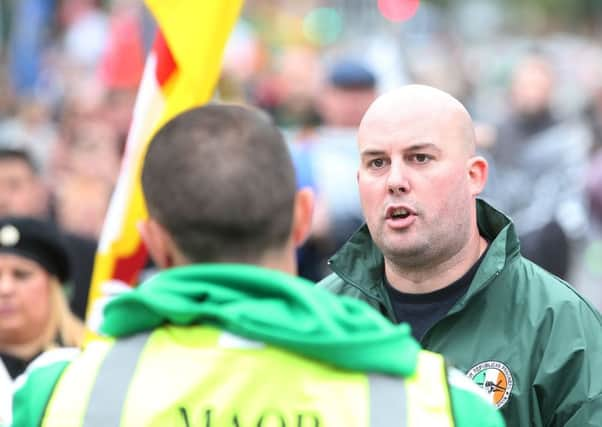Call to tighten bail as Fennell free to attend RoI republican rally


One unionist MP yesterday suggested that criminal suspects who are facing “very, very serious” charges should be barred from both leaving the country or attending controversial events, following the decision this week to alter the terms of Dee Fennell’s bail so he can holiday in Donegal.
Mr Fennell is facing a trio of terror-related charges, all of which he denies.
Advertisement
Hide AdAdvertisement
Hide AdTom Elliott, UUP MP for Fermanagh and South Tyrone, questioned why he was allowed to leave the country in the first place, and why conditions were not imposed which would prevent him attending a republican gathering outside the Province.
For example, he noted that the period when Mr Fennell is permitted to go to Donegal (spanning Monday this week until next Monday) happens to co-incide with a Republican Sinn Fein hunger strike commemoration on Saturday in Bundoran, south Donegal.
Mr Fennell’s bail terms bar him from posting messages on the internet or social media, and mean he “speak only at meetings which serve to promote community interests”.
However, there is no explicit mention in his bail terms barring him from republican gatherings, provided he does not engage in public speaking – indicating that he is theoretically free to attend the Bundoran event.
Advertisement
Hide AdAdvertisement
Hide AdThe criminal charges which he faces all relate to a speech he had given at a republican commemortation in Lurgan last Easter.
“I think in the first place he shouldn’t have been permitted to go out of the jurisdiction,” said Mr Elliott.
“But secondly, in my eyes, whatever jurisdiction he’s in, he shouldn’t be allowed to attend such events.”
A statement from the Lord Chief Justice’s office said the judge in Mr Fennell’s case had “weighed up the evidence and the submissions” in his considerations of the bail terms.
Advertisement
Hide AdAdvertisement
Hide AdUsually, Mr Fennell – aged 34 and from Torrens Avenue in the Ardoyne part of north Belfast – must sign bail in Belfast three times a week.
On Monday Judge Gordon Kerr said he can instead sign with Gardai in Milford, north Donegal – once on Thursday, and again on Saturday.
Mr Elliott said: “Clearly it’s good that he can’t post views on social media, and that he can’t speak at events that could be controversial...
“However, I would have preferred to see it go further and probitied or stopped him from going to and attending such controversial events.”
Advertisement
Hide AdAdvertisement
Hide AdHe added that it was “concerning that he has the potential of going and attending and mixing with people who are involved in maybe dissident republican activity”.
“Clearly the judges have their own remit,” he added.
“I don’t want to interfere in their remit, but obviously I’m just asking that they would seriously consider not allowing people who are waiting on trial for very, very serious offences to leave the jurisdiction.”
He added that he would also like to see them consider a bar upon suspects attending “what may be deemed controversial events” – adding that this should apply to loyalists as well as republicans.
The Lord Chief Justice’s office, which acts on behalf of the judiciary, was asked why there is no bar on Mr Fennell attending republican meetings as part of bail terms.
Advertisement
Hide AdAdvertisement
Hide AdIt said: “When a bail application comes before the court there is a presumption of innocence and therefore in favour of granting of bail.
“A judge must consider whether or not the prosecution have established a recognised risk, such as the defendant being likely to re-offend or interfere with witnesses or leave the jurisdiction.
“If any such risks are identified, the judge must then consider whether a condition or conditions might be attached to the bail to prevent the identified risk arising.
“Unless there is a risk, and no conditions that could be applied to address the risk, then the judge must release the defendant.
Advertisement
Hide AdAdvertisement
Hide Ad“The judge in this case will have weighed up the evidence and the submissions from both lawyers acting for the prosecution and the defendant and applied these principles.
“This will have included consideration of specific conditions necessary to address any identified risks.”
Mr Fennell denies encouraging acts of terrorism, inviting support for the IRA, and addressing a meeting to encourage support for the IRA.
He is expected to appear at Belfast Crown Court on September 6.